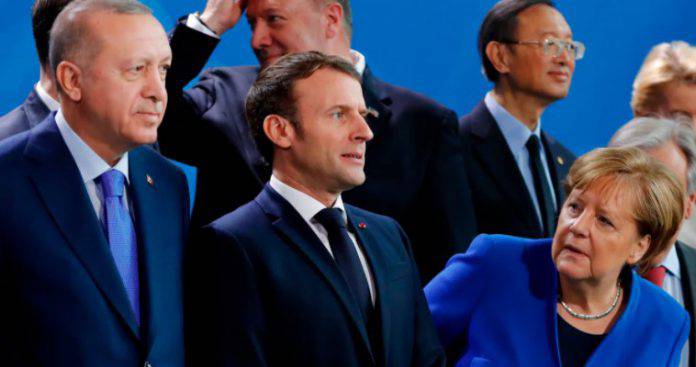Zacharias Michas: The time when Turkey would have conquered Germany and France in three days
01/12/2020
It was in early August 2017 when the Turkish – fanatically pro-government – newspaper Yeni Söz, unleashed incredible threats, claiming that the Turkish Armed Forces could occupy Germany and France within three days! In particular, utilizing – to the fullest extent – the views expressed by the American analyst George Friedman, it stated that the occupation of Germany would be a matter of one afternoon, and of France an hour and a half!
These incredible reports were reproduced by European media. It is not even necessary to point out the absence of the slightest reference to the “Greece obstacle” on the way to the gates of Berlin and Paris. Friedman’s views were based on a 2015 Gallup poll, which found that European states’ resistance to any outside intrusion was problematic.
Only 18% of Germans, 29% of French and 27% of Britons said they would fight for their country. The Turkish tabloid adopted these findings to unleash its chauvinist fervor. That period was marked by the instrumentalization of the refugee-immigration issue by Ankara in order to put pressure on Greece, as the first zone of defense and finally on Europe itself.
Bombastic rhgetoric and overt blackmail are an integral part of Turkish foreign policy. After all, you do not need to be Greek to find out that the neighboring country, in its collective expression internationally, suffers from an incurable imperialist syndrome. It suffers constant crises of delusional greatness and behaves in a disrespectful and offensive manner towards anyone who dares to even raise objections to Turkish positions.
It behaves as if it were the exclusive and authentic interpreter of what is and what is not “fair”. The culmination is the attitude of the Turks on the issue of maritime zones in the Aegean and the Eastern Mediterranean. Military blackmail is called “a response to the maximalism” of others. They declare that islands (i.e. Greek islands) are not entitled to maritime EEZs beyond the territorial waters of six nautical miles and interpret “authentically” the otherwise clear references of the Law of the Sea, as not valid in the region!
Submissive countries
Turkey’s behavior conceals deep-seated existential concerns and insecurities about its viability at today’s borders. Aggressive behavior is a flight forward, an attempt to cover up dangerous internal deadlocks by attempting to set the agenda expansively.
At the same time, it highlights the Turkish inferiority complex, as countries such as Greece refuse to treat them in the same way as the larger ones, such as France and Germany. So if Turkey is prepared to use such language for Berlin and Paris, one understands what the Turkish perception of Athens is. Deliberately, it appears to be literally ignoring her.
Turkey deeply believes that countries like Greece must submit to the will of the regional ruler, that is, Turkey. It does not even recognize the right of the Greeks to sit at the table on equal terms with it, except under the pressure of faits accomplis. Having created an unbalanced situation, Ankara will make a subtle retreat from its original maximalist position, even expecting to be recognized as showing magnanimity towards the impossible!
In its relations with Europe, Turkey certainly exploits the reluctance of European societies for resistance, which is due to a number of factors that are not the subject of this analysis. It is an axiom in strategy that the advantage in a conflict passes into the hands of whoever shows up and is actually willing to sacrifice the most in human lives if a clash turns into an armed conflict.
War fronts
Turkey’s involvement – not always only through proxies – on war fronts, such as in Syria, Kurdistan, Libya and, finally, Nagorno-Karabakh, proves the point. However, even this advantage has its own limiting framework, which is mainly imposed by the economy. Bullying lacks content when it does not correspond to a “wallet” that can support rhetorical insults.
Ankara has already begun to fold in anticipation of the forthcoming EU Summit, as it sees its rhetoric alienated from member states that have backed their own geostrategic choices in Turkey. Because of this, moreover, they have appeared almost all the time as apologists and protectors of Turkey.
Everything will be judged here. The EU must send a strong applicable message to Turkey at the forthcoming Summit, limited to rhetorical condemnation. Turkey’s behavior is such that it is only curbed if it faces severe sanctions. Erdogan will not restrain himself and will return sooner or later if he does not pay a price. But as with the psychology of any bully, with an appeal to geostrategic bullying, the strong reaction is the only one that can influence his behavior.
A state addicted
Turkey is a state addicted to constantly playing with the limits of its opponents’ tolerance, with the ultimate goal of expanding them, betting that the “civilized” adversary will retreat for the sake of peace. If, however, it is severely punished, it will reverse course. This practically means that it will think about it many times before returning to the same tactics.
France seems ready and determined to follow the path of a strict response. The same is not true for Germany, although pressure from society there on the chancellor is now strong. The volume of negative reports about Turkey in the German media has reached a record high. This may not be enough to change the government’s strategy, but it certainly creates a climate that Merkel and her successor cannot ignore for long.
If Merkel is indifferent, the gap that will open between her politics and the climate that is forming in society, which feels offended, will inevitably be reflected in the polls. Therefore, the opportunity should not be missed for the Summit to give a strong response, which will make it clear, in practise, that Turkey has exceeded the limits.





